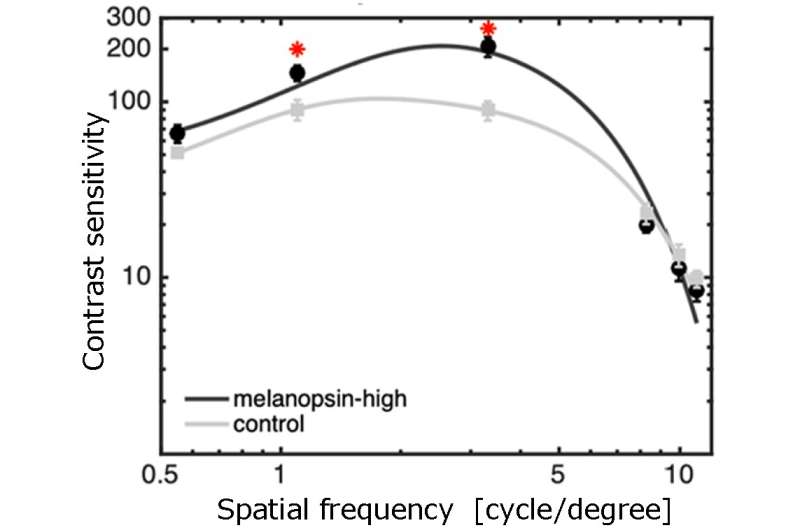This article has been reviewed according to Science X's editorial process and policies. Editors have highlighted the following attributes while ensuring the content's credibility:
fact-checked
proofread
Light quality found to enhance contrast vision

Prof Sei-ichi Tsujimura of the Nagoya City University and Prof Su-Ling Yeh of National Taiwan University and Kagoshima University, have discovered that our visual acuity (contrast sensitivity) can be improved by using a light with a special spectrum that can selectively stimulate melanopsin cells in the retina.
The retina of our eye contains cone photoreceptor cells, which identify colors in bright environment, and rod photoreceptor cells, which work in the dark. It has long been thought that humans see and identify objects by these two types of photoreceptor cells alone. On the other hand, around 2000, the third photoreceptor cells called melanopsin ganglion cells (ipRGCs) were discovered in the retina.
The melanopsin cells have been reported to influence circadian rhythm regulation, pupillary light reflex, brightness perception, mood and so on. For this reason, the study of melanopsin cell function is of great importance and has challenged many researchers.
Professor Tsujimura's laboratory has developed an experimental device that can stimulate only melanopsin cells for the first time in the world by adjusting the color of light (spectrum), and has conducted experiments on the contribution of melanopsin cells to contrast sensitivity. Contrast sensitivity is the ability to distinguish between different shades of brightness in text and images and is one of the most important characteristics in our vision.

For example, a high contrast sensitivity enables people to distinguish between an object and the background behind it. In general, contrast sensitivity is lower in dark environments and increases as the light becomes brighter. On the other hand, further brightening does not improve sensitivity any further.
In this research, Professor Tsujimura and his collaborators discovered that contrast sensitivity in humans is enhanced when the amount of stimulation to melanopsin cells is increased without changing the luminance or chromaticity of the illumination light. In this study, contrast sensitivity was enhanced by using a lighting system with a special spectrum that selectively stimulates melanopsin cells without changing the brightness or color of the light.
This could lead to the development of new innovative lighting devices and displays, rather than simply changing the color or light intensity. The researchers will continue their research into human vision and plan to propose optimal light environments by clarifying the mechanisms in the brain.
The paper is published in the journal Vision Research.
More information: Sung-En Chien et al, Enhanced human contrast sensitivity with increased stimulation of melanopsin in intrinsically photosensitive retinal ganglion cells, Vision Research (2023). DOI: 10.1016/j.visres.2023.108271





















